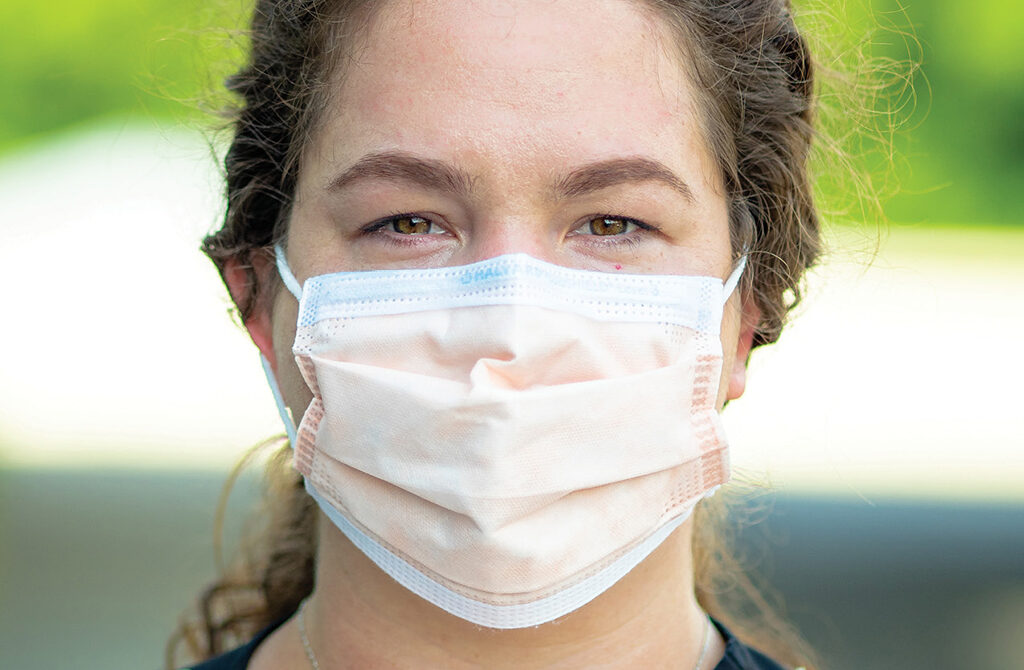
AD ASTRA PER ASPERA
The COVID-19 pandemic altered life as we know it and shut down campuses around the world. It also called on Campbell University students, faculty and alumni to persevere and lead in ways they never imagined.
__________________________________
By Billy Liggett | Photography by Ben Brown
For seniors like Ka’Deem Wynn, it meant an abrupt end to four years of personal growth and career preparation. The college experience without a capstone. Uncertainty looming over the future.
For student-athletes like Hayley Barber, it meant a dream unfulfilled. A college basketball conference title and an invitation to the Big Dance, only to have midnight come before the carriage arrived.
For professors like Meredith Williams, it meant a sudden transition from the personal connections she’d developed in the classroom over her 17-year career to remote learning, relying on online conference technology to educate and track more than 100 students.

For experts in their field like David Tillman, it meant becoming a voice of reason in the North Carolina public health sector during a time of confusion and uncertainty as some sought to distort research and facts to support their own ideals.
And for health science alumni like Krista Udd, it meant being asked to risk her life to save others at a New York City hospital hit hardest by the outbreak. Taking the skills she’d learned as one of her school’s first physician assistant graduates and putting them to use in a setting she could only describe as “unsettling, chaotic and surreal.”
The COVID-19 global pandemic has changed our world. And the impact the virus has had and will have on higher education and institutions like Campbell University is both far-reaching and dramatic. Not only did the virus — which by early June had infected more than 6 million people and killed nearly 400,000 globally — shut down the University’s campuses for the first time in 120 years, it’s put into question what life at Campbell will look like in the coming months and years.
But Campbell has seen difficult times before. Born in a time of post-Civil War reconstruction, the still-fledgling Buies Creek Academy was dealt a blow in 1900 when a fire all but wiped out the entire campus. From the ashes rose Kivett Hall, a renewed purpose and a motto the school has championed through great depressions, recessions, world wars, natural disasters and, yes, epidemics.
Ad astra per aspera. To the stars, through difficulties.
“The past two months have been some of the most challenging in the history of this institution,” says Campbell University President J. Bradley Creed. “But these challenges and trials of life make us stronger. They are the crucible which temper us. It’s my hope these difficult times are going to make all of us stronger.”
__________________________________
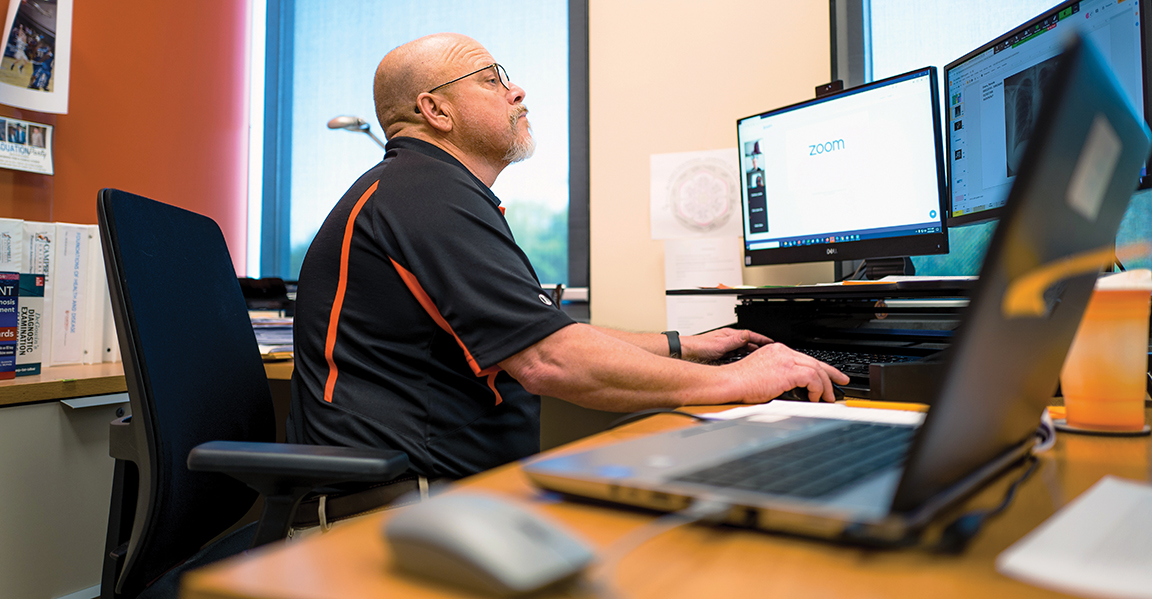
Spring interrupted
Meredith Williams had thought about trying out online instruction before the pandemic hit.
A 17-year math professor and chair of Campbell’s Department of Mathematics and ITS, Williams approached the University’s Adult & Online Education administration about creating a course and went through a weeks-long training session to learn the ins and outs of remote learning. Still, she entered the spring semester this year not entirely confident that she was ready to take on a course or two in addition to her three current in-person classes.

“I like the personal interaction of teaching,” says Williams. “I want my online students to feel like they’re getting the same delivery from me that my in-class students get. I didn’t think three months of training was enough to be ready to teach one online class.”
On March 12, she was given just four days.
On that day, the University Board of Trustees voted to transition all in-person classes on all Campbell campuses to online and remote learning. The original plan was for the change to last from March 16 to April 5. At the time, North Carolina had just 15 reported COVID-19 cases and no hospitalizations, and Gov. Roy Cooper had issued restrictions on gatherings of more than 100 people.
By March 16, Campbell’s first day of remote learning, confirmed cases in the state had more than doubled. Among the new cases was the first reported Campbell student to test positive after a visit to the University’s health center.
By March 19 — with cases climbing and campuses across the nation beginning to shut down — Creed made the difficult decision to make the transition to online learning permanent for the spring semester and shut down all residence halls and campus-run apartments until the campus was deemed “safe” for students to return. This also meant a halt to all spring sports (the Big South Conference had previously canceled all spring games a day earlier), all academic events and Study Abroad travel and a postponement of spring commencement in May.
Within a matter of days, Zoom meetings and WebEx classes became the new “normal” for Campbell students, faculty and staff. The annual Wiggins Memorial Library Academic Symposium became a virtual symposium, with more than 100 students taking part with online presentations. The scheduled opening of the University’s 110,000-square-foot student union was delayed, and the facility was introduced to the public for the first time through a 40-minute virtual tour hosted by students and staff on May 6.

And while University officials remain hopeful commencement can take place sometime this year, the Class of 2020 was honored with a virtual commencement celebration on May 9.
“Hopeful” is the key word in looking ahead.
In April, Campbell administration formed a Fall Semester Task Force led by Vice President for Student Life Dennis Bazemore to better plan for how to manage “traditional operations” of the University while also protecting students, staff and the Campbell community. Campbell announced in June it would begin its fall semester on Aug. 19 and end all face-to-face instruction before the Thanksgiving break (there will be no fall break, and finals will be administered online). Campbell traditions like Welcome Week, Freshman Convocation and Homecoming are, for the moment, in a state of flux. As are football games and other athletic events.
Williams says she hopes to see her students in person when August arrives. But should the University have to go back to online classes, she says she — and her fellow faculty members — are up for the challenge of educating their students by any means necessary.
“It’s not easy for us, but it can be even harder on the students,” Williams says. “When we made the transition, I had students who weren’t able to access the class. One student was relying on his public library for WiFi access, but then that closed. I had international students who took weeks to get back home. It’s been a challenge, but my students have been great as far as being open to what I’m trying to do, and they’ve been supportive of the process.”
Like many professors and all working parents who’ve been asked to telecommute, Williams has been forced to balance performing her job and making sure her children — two boys, ages 11 and 13 — are keeping up with their own online learning.
“They’re not the quietest children,” she says, recalling a moment of levity during these difficult times. “There was one day I had asked my 13-year-old to be quiet while I recorded a video for a class. I got through all but the last 30 seconds of it, and he walked into the room and burped very, very loudly. I was so close to being finished, and I didn’t want to start over, so I posted it. I think the class got a kick out of it — one student rated it a 9 out of 10 for the burp and for my reaction.”
__________________________________
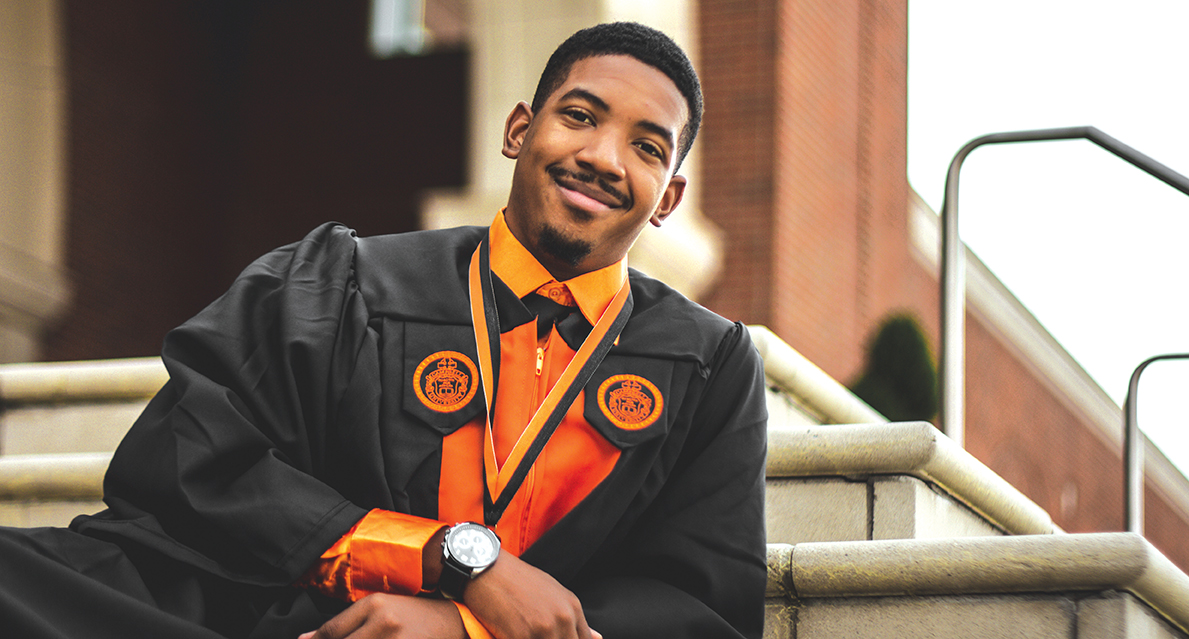
NO CLOSURE
Ka’Deem Wynn was looking forward to the final stretch of his college career when he returned to Buies Creek from spring break in early March.
The final memories with friends. Several photography and videography projects lined up. The annual CAMMYs ceremony. Walking the stage at spring commencement.
The buzz was loud when students returned to classes on Monday, March 8. Colleges and universities across the country had begun to shut down over the COVID-19 pandemic, its spread considered to be in its infant stages in the U.S. at the time.
By Thursday of that week, the announcement was made — Campbell would transition to online through early April. Soon after that, the transition was extended through the semester, and all students living in residence halls or on-campus apartments were asked to leave for home.
For Wynn, a communication studies major and former cross country student-athlete, that meant going back to Palm Coast, Florida, and finishing his degree online nearly 500 miles away.
“You have this dream — college is supposed to be this big experience for you, and you expect it to end a certain way,” says Wynn. “And when it doesn’t, you feel like you’re in limbo, if that makes sense. It’s not any one thing I’m missing out on — you just want those final few months to accept the end of it. Campbell was my home for four years, and it almost felt like I was being evicted early. I would have just liked to have finished on my own terms.”
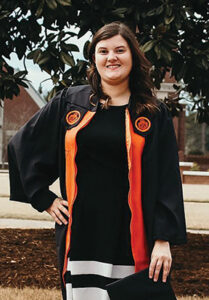
Abigail Pore was already home in Mebane, North Carolina, getting work done on her car when she received word that her time on campus, with her friends and classmates, had come to an end. While she and her classmates officially earned their degrees during a virtual commencement ceremony broadcast to more than 1,400 people on May 9, she feels her undergraduate experience still lacked one very important thing …
Closure.
“While I didn’t miss having a graduation enough to possibly risk lives, I do think I missed the feeling of being able to fully sit with being done,” says Pore, who earned her degree in English. “Finishing an online exam in my room just to turn and be able to tell my dog is much different than a celebratory trip to Cook Out or a museum trip with friends.”
Hayley Barber’s final season of college basketball came to a sudden end twice this year.
The first time was back in late February, when a knee injury forced the senior to miss the final four games of the regular season. When she discovered that her injury wasn’t season ending, she was primed to lead the Big South Conference champions to their first NCAA Tournament in 20 years. Barber was scheduled to play in her team’s conference quarterfinal game at home against Presbyterian on March 12 when the news came down. No conference tournament. No NCAA tournament. No basketball. No spring collegiate sports whatsoever.
Barber was crushed.
“Just a chance to play one more game, that’s all I really wanted,” she says. “Once [the tournament was canceled], it did not seem real for a really long time. It’s so weird because the weather outside was perfect and everything seemed kind of normal. But the world just stopped.”
The pandemic has presented challenges for every college student. For many, that challenge is trying to transition from school to “real life” and careers in a tanking economy and uncertainty of when this will all end. For many others, the struggle is mental — intense feelings of anxiety and frustration or loneliness and isolation while disconnected from friends and loved ones.
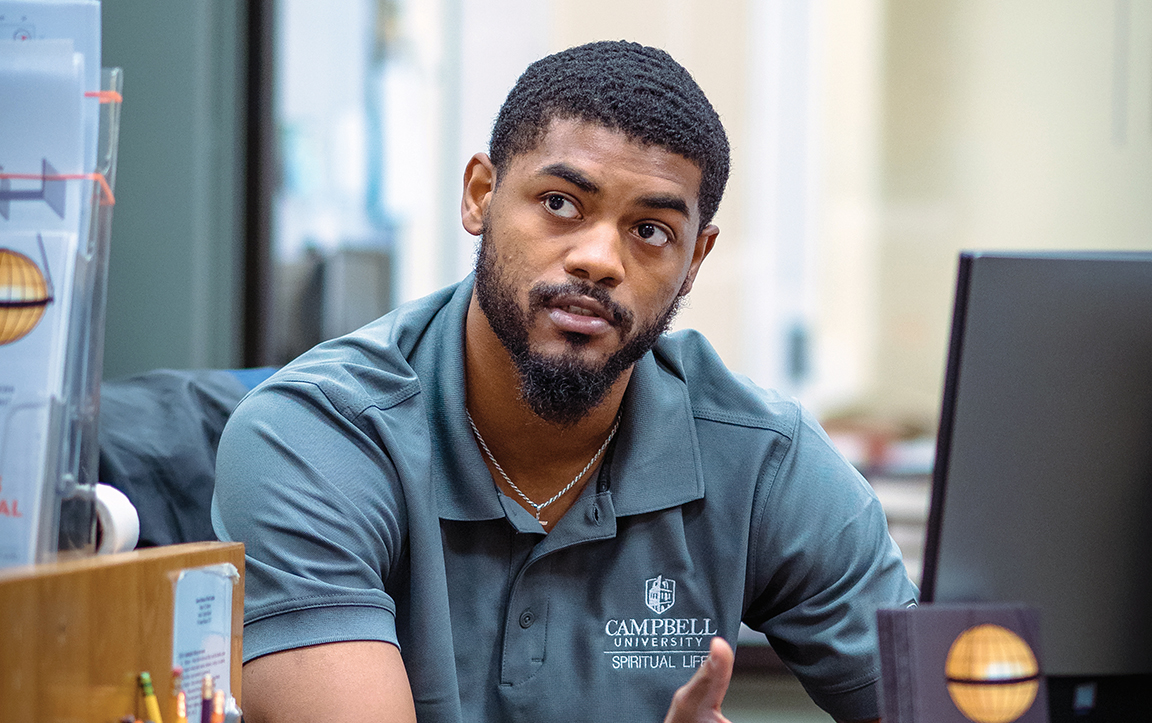
Researchers at Penn State University published a report in April addressing the mental health of college students during the outbreak. The research found the disruption of academic routine, the abrupt evacuation of campuses (for many a “homelike and welcoming” atmosphere), the competitiveness in the job market and the overall challenges of living through social isolation and the worry of contracting a potentially deadly virus have all led to increased anxiety and negative psychological consequences for college students. For some, it’s led to an increased risk of substance abuse and self harm.
Kellie Nothstine, dean of Campus Life and Title IX, and Tory Weaver, mental health therapist for Campbell counseling services, say the University has been attentive to the needs of students during these unprecedented times.
“Before the pandemic, 66 percent of those who were coming to Campbell’s counseling center were coming because they felt socially isolated,” says Nothstine. “So students were already struggling with this.”
This forced isolation, Nothstine says, has only added to these struggles. She points to studies that have found the more time a person spends looking at a screen instead of having face-to-face interactions, the more likely they are to report depression and anxiety. Now factor in that all classes the past few months were done online and that just about all social interaction has been done through FaceTime, texting, Zoom meetings and other forms of social media … and it’s only made it worse for a generation that already spends up to nine hours a day looking at a phone, tablet or computer screen.
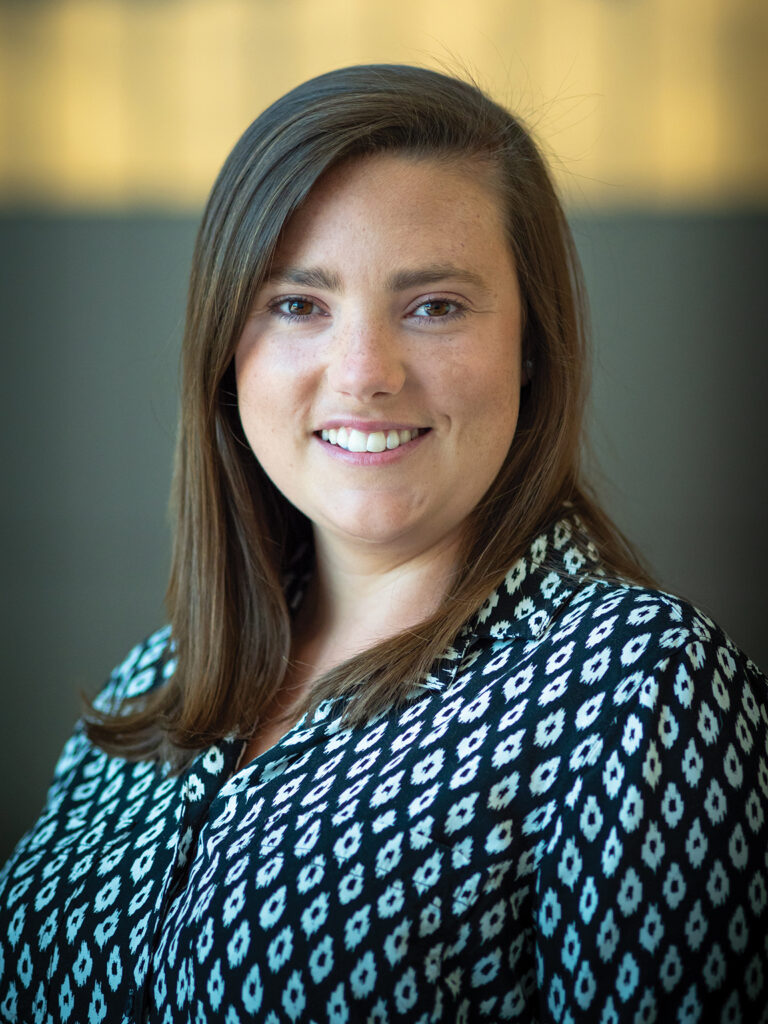
Counseling Services and Student Life have worked to make the content they share with students more engaging and, hopefully, uplifting, according to Weaver.
“There’s research that shows if you’re passively scrolling on social media, that can be connected to mental health struggles,” she says. “The difference with what we’ve tried to do is it’s more purposeful. If you’re purposely using social media to connect, to laugh with each other or to do things like watch parties, those are things that can engage students and make their social isolation more bearable.”
Purpose is important. And for many students, the pandemic has only heightened the importance of the degrees they’re working to obtain.
Sterling Ta’Bon, who earned his second Campbell degree (a Master of Public Health) in May, says COVID-19 has shone a whole new light on his career path and the impact he can have. He says pandemics and epidemics were thoroughly discussed in public health courses throughout his time at Campbell, from preparation to response and the impact they can have on rural and underserved communities.
For Ta’Bon — who has worked with children in foster care during his time here and who has an eye on a career in public policy and possibly politics — the world has become a case study. And coming at it with a “public health mindframe,” he says he’s optimistic about the future.
“COVID-19 has changed how important my career is,” he says. “Not a lot of people realize everything that public health officials do. And now, we’re the experts everybody is turning to. Public health is the reason we have seat belts and stop lights. Preparation and knowledge can save lives.
“We learned at Campbell that things like this could happen and hit us hard, but if we’re prepared for it, we can save lives and move forward.”
First-year Master of Divinity student Johnny Serratt says the pandemic has made him and other theologians think hard about what “presence” truly means at a time when church leaders have been forced to lead and minister without the benefits of face-to-face interaction (laying hands on someone to pray or offering a needed hug).
“For ministers or future ministers, we’re taking very seriously our role as counselors — listening to our parishioners and being there for them when we can’t actually be there with them,” Serratt says. “Then there’s the challenge of mobilizing congregations to do good works and directing our younger members to help out our older members.
“We need to pay attention to the ways social media and the internet offer ‘good presence.’ There’s a large group of parishioners living in nursing homes or unable to travel who have only been able to access the church through TV or online. Now that everybody has been forced to worship this way, we need to reconsider how effective we’ve been in reaching these people.”
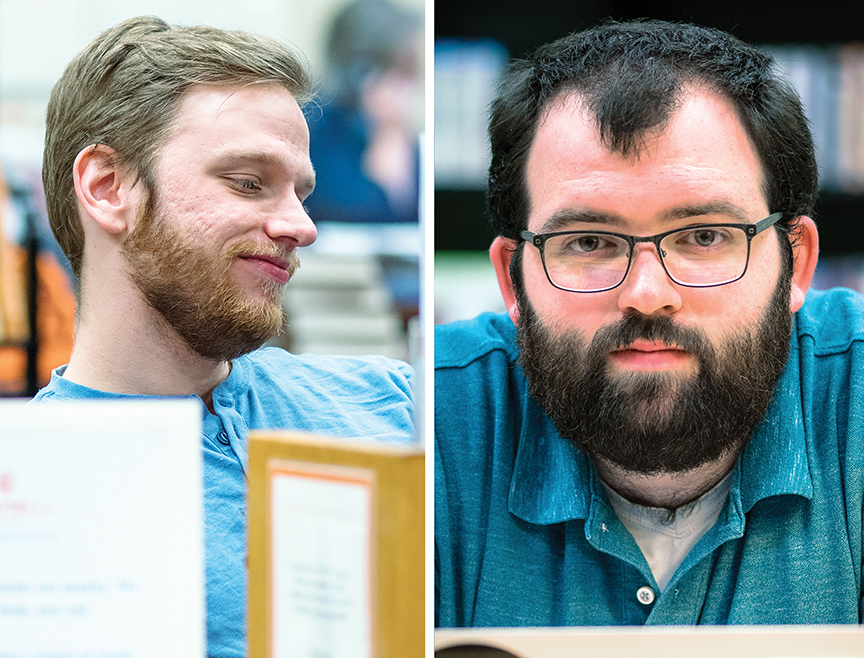
Second-year Master of Education student Zane Weekman says watching his professors navigate the sudden change to online learning has been just as educational as the content in their lessons. A future high school history teacher, Weekman says all new teachers will need remote teaching skills in the future — pandemic or no pandemic.
“What I’ve seen that’s been effective is having one week to work on assignments and the next week for video conferencing and discussion on what we’d done the previous week,” Weekman says. “All of this has forced me to look at how I would have handled this situation as a teacher if I suddenly didn’t have face-to-face time with my kids. Would I still be effective? Would they still get something out of this?”
Ka’Deem Wynn says everybody is learning from COVID-19. He calls the pandemic a “defining moment” for his generation. “This is our generation’s 9/11,” he says. “It’s changed our lives. No question.
“But I think a lot of people my age, we’ve gotten good at adapting to things. And I think in the end we’ll be alright and we’ll figure this out. It might take a little bit of time, and it won’t be easy. But we’ll figure it out.”
And for Abigail Pore, getting through this means counting blessings and focusing on the positives.
“I’m lucky that I can reach out to people, even if it’s FaceTime or through long emails,” she said. “I’m lucky that I am safe and not concerned about a family member right at this moment who has the virus. Holding onto that and counting my blessings helps me to hold my own feelings of needing closure with the feelings of wanting the world to heal. I am not being selfish by acknowledging some hurt, yet I cannot forget the world in my own feelings if I want to remain unselfish.”
__________________________________
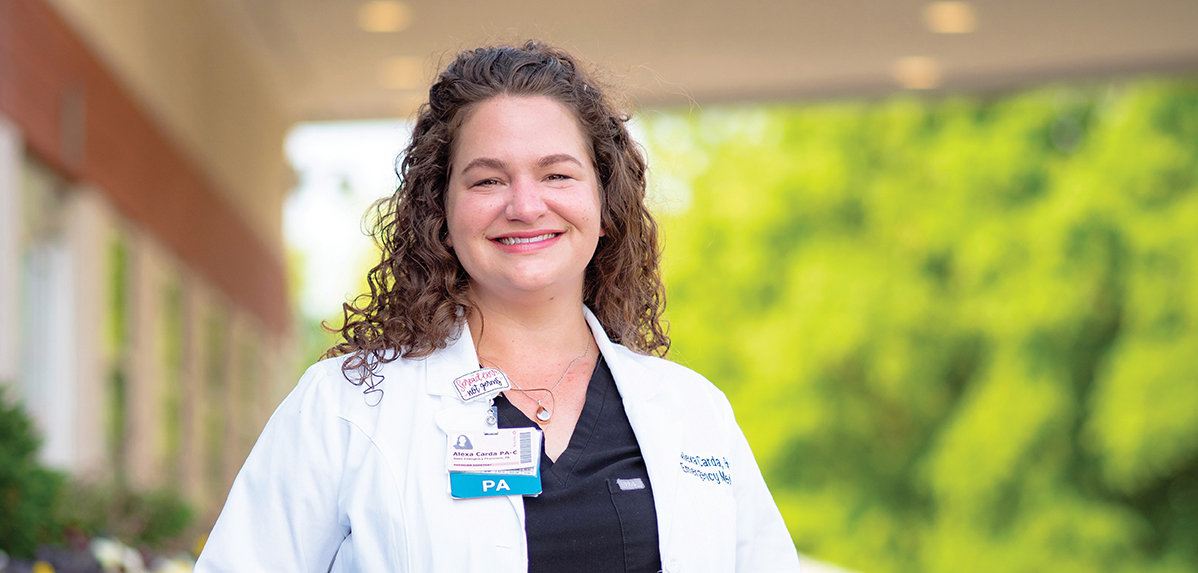
THE FRONTLINE
Preparation and protection.
That’s how Alexa Carda Gaters describes the atmosphere in hospitals throughout Wake County two months into the COVID-19 pandemic. Through June 1, the novel coronavirus has infected nearly 30,000 North Carolinians (killing 944) and more than 1,500 of those cases (36 deaths) have come out of Wake County.
It’s not an epicenter for the virus — cities like New York, Philadelphia, Los Angeles and New Orleans have been hit hard, and hospitals in those regions have seen the worst of what the virus can do to large populations. But hospitals like WakeMed have worked around the clock to ensure emergency departments and intensive care units are prepared for an influx of patients, should they come. They’ve also erected and utilized outdoor drive-up tents for testing, COVID departments within the ER, outpatient respiratory diagnostic centers and constant updates for physicians and residents.
COVID-19 has forever changed Gaters’ career and the professional futures of all Campbell University health science alumni and students.
A 2015 graduate of Campbell’s Master of Physician Assistant Practice program and a Wallace Student Society president, Gaters was originally called to medicine as a young teen when she lost her mother, Shirlee Carda, to cancer. The High Point native and UNC-Chapel Hill graduate chose the physician assistant path because she liked the flexibility and lateral mobility of the profession. Today, she works for Wake Emergency Physicians, PA (WEPPA), an independent group of physicians and advanced practice providers that has an exclusive contract to staff all of WakeMed’s seven emergency rooms in the Triangle region.
“We’ve seen the full spectrum of illness in our emergency departments, from minor coughs to respiratory distress requiring intubation,” Gaters says. “And although we are accustomed to immediately rushing to the bedside in the ED, we now take the time to don our [personal protective equipment], knowing that they can make a life-or-death difference for ourselves, our families and our colleagues.”
She says her education at Campbell prepared her for the current challenge. She can still hear the words of PA Chair and Director Betty Lynn Johnson reminding her to “stay flexible and always keep the patient first, treating them as you’d want your own grandmother to be treated.”
“This has especially helped me over the past couple of months, as we’ve had to stay flexible to keep up with the evolving guidelines and protocols each day, and to practice medicine in ways we aren’t familiar with,” Gaters says. “My patients need my compassionate care and reassuring touch more than ever, as visitor restrictions mean that most are completely alone in the emergency department and when admitted to the hospital. Taking an extra moment to listen to them, reassure them that they are in good hands and to call to update their worried families, can make a world of a difference in an already challenging time.”
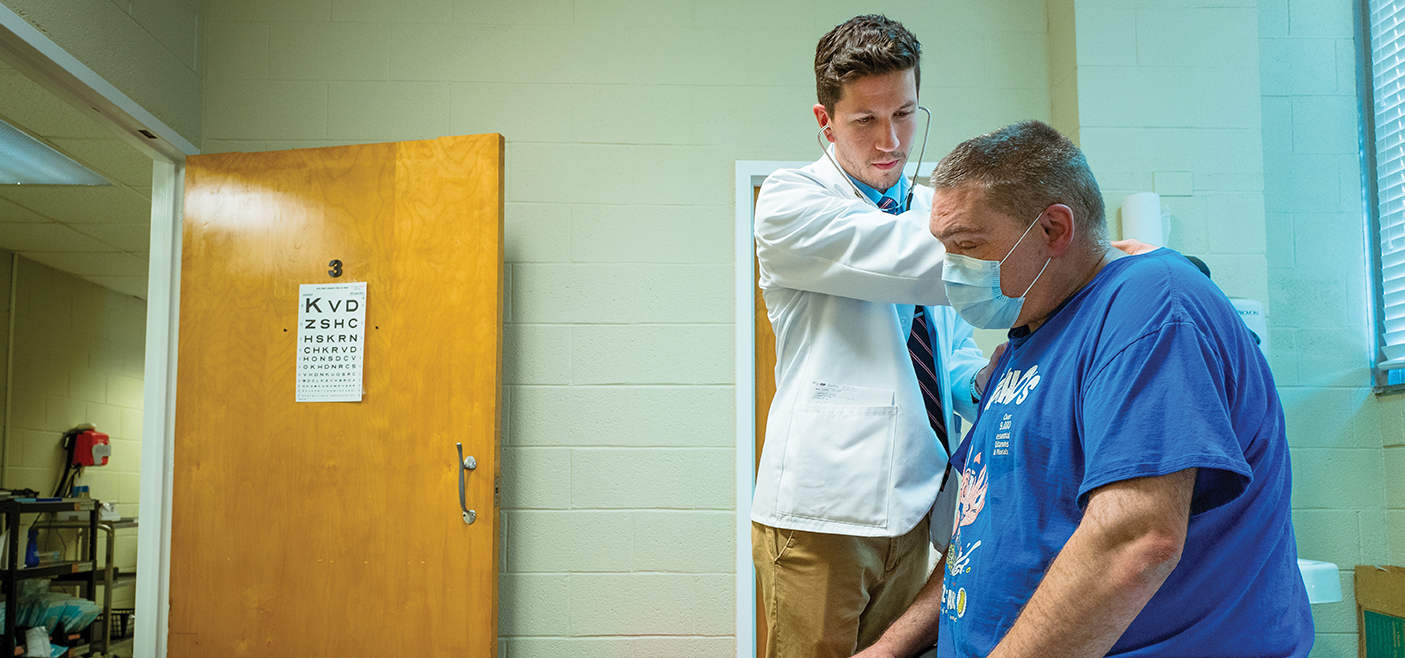
When Campbell launched its PA program in 2011, it marked the beginning of a decade-long plan to purposefully expand its offerings in health sciences (its College of Pharmacy & Health Sciences had made a name for itself in the pharmacy world, and the University was poised to grow from that seed). Osteopathic medicine, nursing, physical therapy and other health science programs soon followed, born to not only serve underserved regions of North Carolina and the Southeast but to also answer the call for projected health care professional shortages throughout the country.
Few factored in “global pandemic” to that need, but that’s where we currently stand. Not only are these professionals in demand in most regions of the country, recent graduates are being called to step up in many areas where the risk is too high for older nurses and physicians to be in close contact with infected patients.
“[The pandemic] has changed the perspective of how I look at medicine and the career I’ve chosen,” says Bryan Gottwalt, third-year medical school student whose hospital rotations were cut short in February when school officials made the move to protect its students from working in high-risk areas. “Medicine is something I’ve wanted to do for a while, because I wanted to help people. But now I’m seeing just how essential it is. It’s been sobering to hear what some of my friends who are resident doctors are going through — a lot of long hours and just increased expectations in every regard.”
With his rotations put on hold, Gottwalt, who’s working toward a career in family medicine, decided to put in time at the Campbell Health Center on campus, seeing Campbell students and staff, as well as Harnett County residents. The High Point native says he wanted “at least one day” of in-person training this semester “learning and doing something I’m committing the rest of my life to.”
“Physicians and all health care professionals are making an enormous difference on a regular basis,” he says, “and I want to do that. I may not find myself working in a crisis like this again, but I want to be there alongside people who want the same thing if the situation ever arises again.”
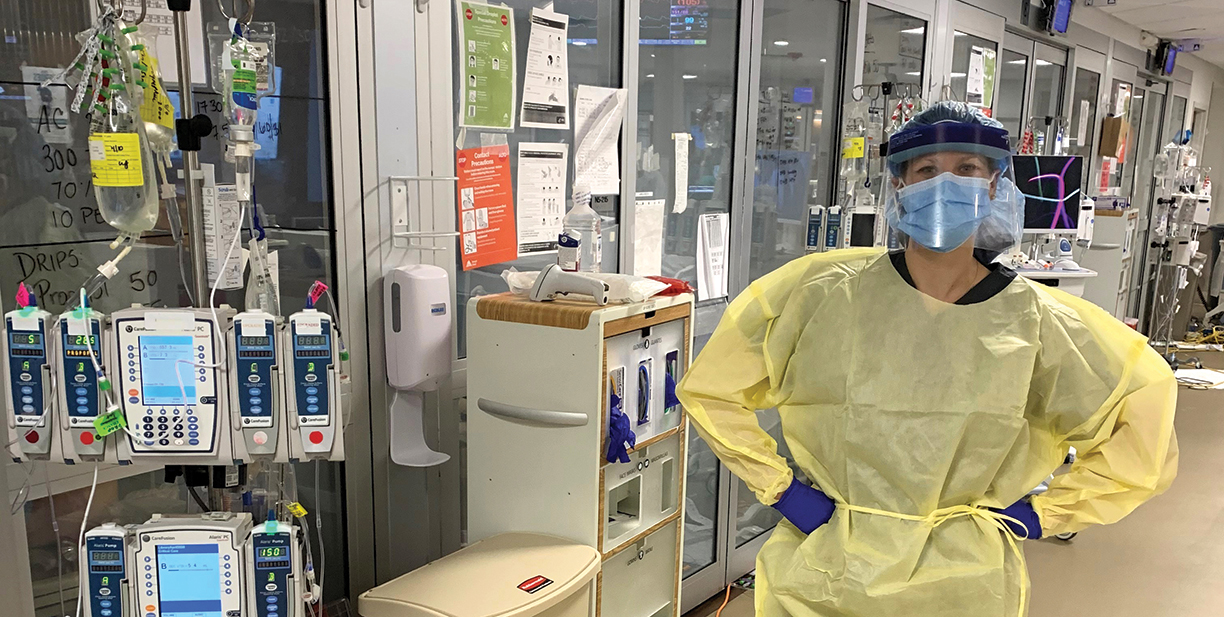
Krista Udd, another 2015 Master of Physician Assistant Practice graduate, is one of the many who are making a difference and risking their own health in the process. Udd was working in the cardiothoracic ICU of a hospital in New York City (Manhattan), at the heart of the pandemic outbreak in the U.S. The area accounted for more than 204,000 COVID-19 cases and more than 16,400 deaths through June 1.
For the past two months, Udd has worked in the COVID ICUs — an experience she can only describe as “surreal.”
“I will never forget the day our unit was opened for COVID,” Udd says. “We rushed all the remaining cardiac ICU patients to a makeshift ICU on a step-down floor so that negative pressure filters could be added to the rooms to prevent the virus from aerosolizing into the common areas, making our rooms safer treating COVID-positive patients. Over the remaining 10 hours of my shift, the admissions began pouring in. Most of them needed immediate intubation, some were acutely hemodynamically crashing and needed immediate central access, while others were struggling to breathe on one form of respiratory support or another.”
She said the experience made her head spin. She and her team were overwhelmed by a scene she described as “absolute chaos.”
“We ran out of IV tubing, central line kits, ICU ventilators and masks with shields,” she says. “Patients were arriving so quickly, there was no time to adequately evaluate them, admit them properly or call their families. It felt like a war zone, with doctors, PAs and nurses running from room to room, treating emergencies only to be interrupted by a seemingly more pressing matter. There was a lot of yelling, confusion, frustration and fear.
“When the dust settled at the end of that shift, orders were not completed, consults were left outstanding, some lines still needed to be done, but every patient was still breathing. I have never been more proud of the medical team, my team, than I was on that day. We had done our best, and though it didn’t feel like it that day, looking back a month later I can honestly say it was enough.”
Eventually, her hospital and her team adapted. As the cases mounted, their response became more focused and more calculated. They learned on the spot. Udd has seen patients succumb to the disease, and she’s seen patients survive and overcome it.
“This was never how we expected to practice medicine,” she says. “COVID-19 humbled us all. If this experience has taught me anything about medicine, it is that as a community we are determined, creative and capable of taking on whatever challenge is put in front of us. We believe in our cause, and we believe in the oaths that we took as medical providers to ease our patient’s suffering and above all else, do no harm.”
__________________________________

RURAL RESPONSE
Dr. Nicholas Pennings, chair of family medicine for the School of Osteopathic Medicine and director of the Campbell Health Center, helped lead the University’s initial response to COVID-19, providing regular updates to the community and setting guidelines to curb the spread of the disease while students were still on campus.
Pennings says in addition to strengthening his students’ determination to enter the health care field and make a difference, the pandemic has also served as a learning tool for Campbell students, residents and licensed physicians.
“One things we’ve taught is infection control and infection management, so we’re seeing scenarios play out that we’ve only discussed in the past,” Pennings says. “[COVID-19] has also sparked the growth of telemedicine. This virus has shown the value of telemedicine to allow us to communicate, connect and evaluate our patients without creating a risk to the health of health care professionals and other patients in the exam room.”
Campbell’s mission to serve patients in rural areas was recognized by the North Carolina General Assembly when it passed its $1.6 billion relief package signed into law on May 4. Campbell was one of five universities included in the “COVID-19 research” portion of House Bill 1043 — joining Duke, UNC-Chapel Hill, East Carolina and Wake Forest.

The $6 million allocated to Campbell directly impacts the work and mission of the University, which has been tasked to form a community- and rural-focused primary care workforce response to the pandemic. Medical faculty and students at Campbell will work to “support community testing initiatives, provide treatment in community-based health care settings, monitor rural populations, educate health professionals on best practices for a pandemic response and support rural communities through primary care,” according to language in the bill.
Pennings says the grant and Campbell’s work with rural populations is important as the virus continues to spread in outlying areas, even while major metropolitan areas are starting to see a decline in new cases.
“Rural areas are still home to food processing plants, nursing homes, industries and other areas where people are living or working close together, and the person-to-person spread in those settings can be much quicker, then spreading into the communities,” Pennings says. “One of the important things we can do is improve contact tracing. We need to be able to identify new cases as they occur, to diagnose people for testing and trace the contacts of those people properly quarantined, and isolate individuals to prevent the spread. That’s an important role Campbell’s public health program can take on.”
David Tillman, chair of the Department of Public Health at Campbell, and Wes Rich, associate dean of health sciences, have tracked COVID-19 since its inception in North Carolina and have offered their expertise to several media outlets and in online conferences over the past few months. Tillman says while rural counties are experiencing (on the whole) fewer cases per population than higher-density urban areas, they are experiencing higher hospitalization and death rates for a variety of reasons.
“Rural areas tend to have older populations, slightly sicker populations and limited access to resources, such as health care. You put those factors together, you get a tinder box of what this novel virus can mean to rural communities,” Tillman says. And while some urban areas are starting to see a “flattening of the curve,” rural areas are either peaking or yet to peak. Hundreds of rural counties experienced their very first COVID-19 case in May.
Rich says he worries that a “reopening” of North Carolina and the nation that’s done in haste without carefully planned guidelines in place will erase all the work that has been done to “flatten the curve” since March.
“Flattening the curve doesn’t mean we’re eliminating this,” Rich says. “It means we’re extending this out. Cases we would have seen in a one-month period, we instead see in a three- or five-month period. It gives people time to be sick, get good care, recover and then let the next group do the same without overwhelming our health care facilities. It’s mitigation. Until we have a vaccine and good treatment practices in place, mitigation is all we have.”
__________________________________
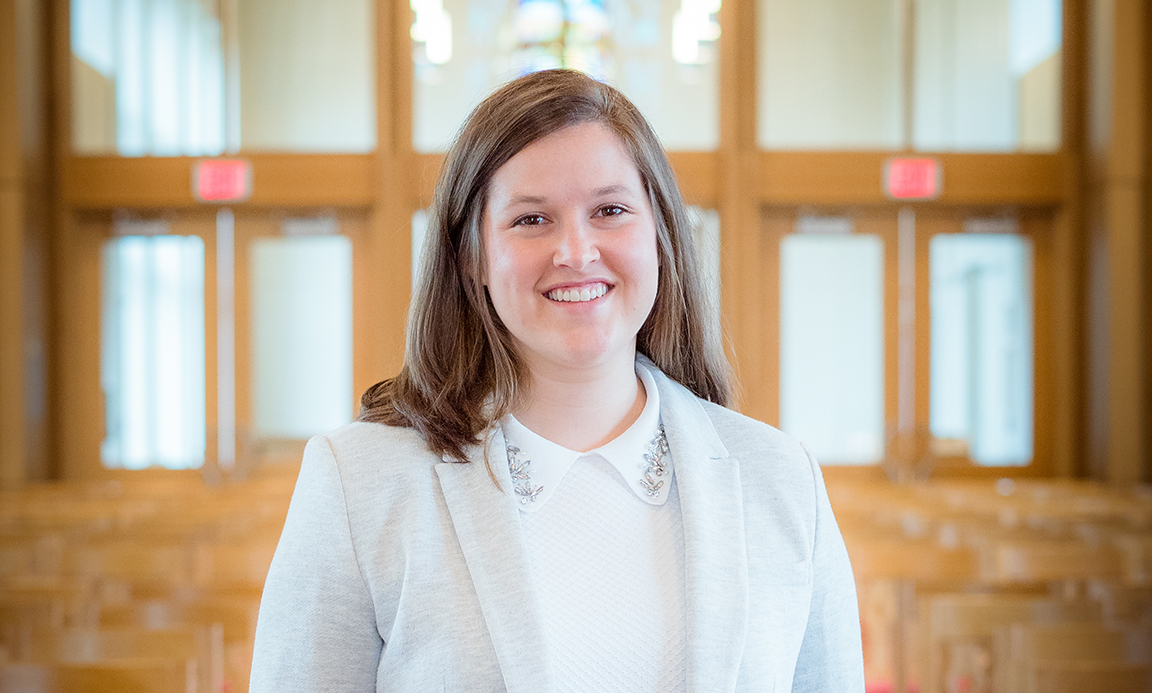
COMMUNITY OF RHYTHMS
What will Campbell University look like in the fall? In 2021? In five years?
These are questions that, unfortunately, do not have a solid answer. When the cabinet and University Board of Trustees agreed to suspend all in-person classes through the summer, it immediately formed a task force to look into what would need to happen to have students back on campus in the fall — assuming state and national executive orders support the idea.
“We’re talking a lot about how we are going to manage a mass of people at a time like this,” says Dennis Bazemore, vice president for student life and head of the University’s fall semester task force. “How do we do this and ensure they’re safe here? How do we handle food? How do we handle housing? Athletic events? These are questions we need to research before we make those decisions.”
The University announced in May that should the campus reopen in the fall, Campbell will provide all residential students with private rooms in their residence halls for the academic year. Campbell was the first university or college in the state to announce such a plan for the fall — a plan designed to reduce the amount of cohabitation as much as possible.
In addition to the virtual commencement in May, Campbell has shifted all orientations and campus visits to the virtual realm. The University has kept in contact with not only its students, but its future and prospective students and alumni through a series of videos and live streams. President Creed began weekly video messages to the Campbell community in late March, delivering updates on important announcements and providing words of encouragement and hope through uncertain times.
In early June, the University announced that undergraduate main campus classes would begin on Aug. 19 and all face-to-face instruction on campus would end on Nov. 24 (the Oct. 8-9 fall break will be eliminated). Main campus undergraduate students will not return to campus after the Thanksgiving break, and all final examinations will be conducted online.
Spiritual Life has also played an important role in not only keeping the community informed, but providing counseling through faith — important for a University with a Christ-centered focus, says Faithe Beam, associate vice president of spiritual life. Like Creed with his videos, Beam and Campus Minister Louisa Ward have sent weekly “words of encouragement” emails to Campbell students, faculty and staff.
“It’s important to put out a word of care to our community,” Beam says. “Not only do we need to continue to function and know who we are as a University, we have to do so with a sense of solidarity. We’re a community of rhythms, and when our rhythms are disrupted, we need to care for each other and support each other, even when we’re scattered in so many different places.
Beam and Ward say using faith as a support system can help create a new sense of community and a new sense of rhythm.
“Our community says ‘welcome home,’ ‘you belong here,’ ‘you can be loved here’ and ‘you’re known here,’” Ward says. “It’s a community we’ve all worked so hard to build. It’s not fragile, even if we’re not here in person. We can still care for each other and have a ministry through presence. We can still be present with each other even if we’re not close. It gives us hope. And ‘hope’ is a good word.”
Students. Professors. Staff members. Alumni. Teachers. Health care professionals. Ministers. Business owners. Military personnel.
All of these lives have changed because of the pandemic. And all of them have been asked in some way to contribute to the greater good, whether it’s through their profession or through following guidelines to stay home and distance from others who face a greater risk.
Alexa Carda Gaters says the outpouring she’s seen toward health care professionals has encouraged her and brightened otherwise stressful days. But what has been most rewarding is being able to serve her community as a helper and healer.
“I believe everyone has an inherent desire to help others in some way,” she says. “We just have to discover and nurture the gifts that God gave us to learn how we can best realize this purpose in life.”
Online: Continuous updates to COVID-19 and its effect on Campbell University and decisions moving forward can be found on the University’s coronavirus page online: campbell.edu/coronavirus.
Contributors: Written by Billy Liggett, main photography by Ben Brown. Kate Stoneburner, Stan Cole, Will Bratton, Dr. Nicholas Pennings, Sarah Hardin, Krista Udd, Meredith Blalock and Lissa Gotwals contributed to this report.
Editor’s Note: A few changes were made to the web version of this story, as COVID-19 statistics and decisions by Campbell University concerning the fall semester changed since the magazine went to press.

